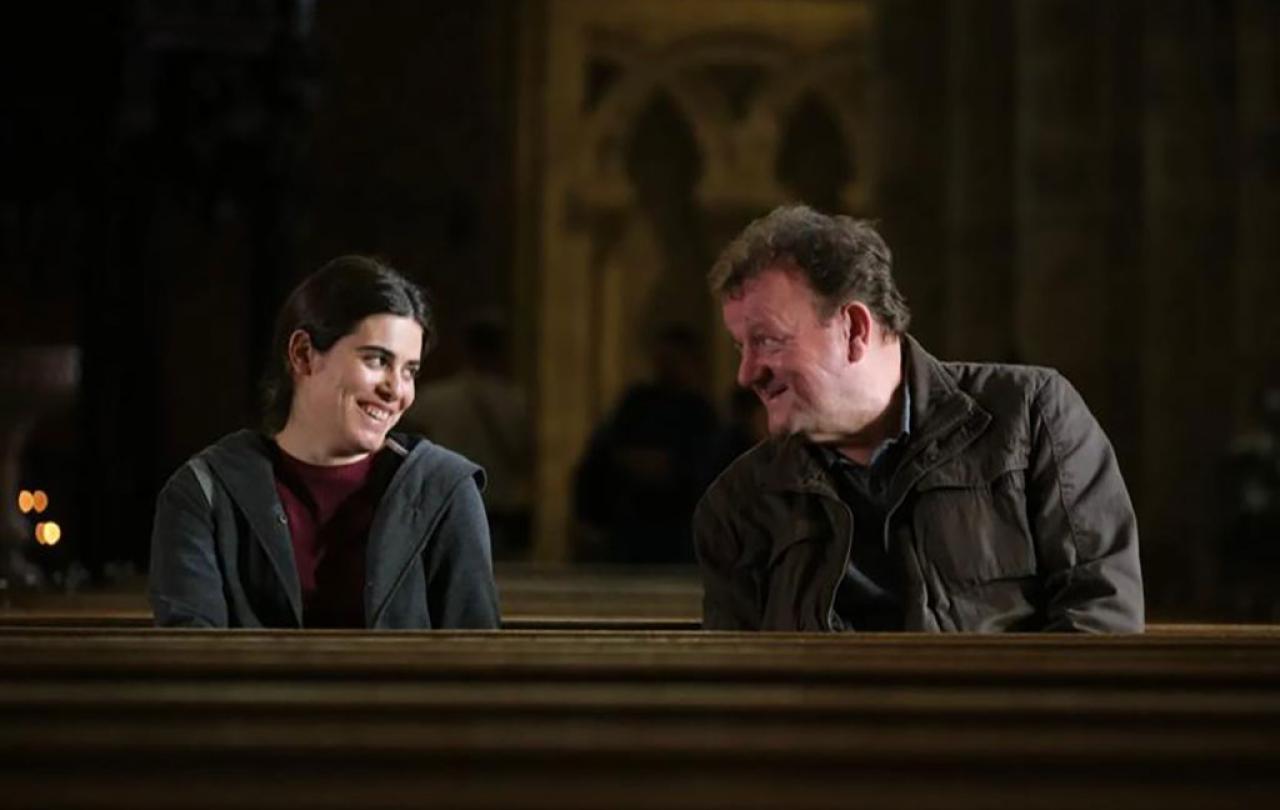
In the dusty back room of the rather rundown Old Oak pub in County Durham, northeast England there is a faded black and white photo. It shows the very same room packed full of hungry families sharing a community meal together. Below it is written a sign:
“When you eat together you stick together.”
Pub Landlord Tommy Joe Ballantyne explains to young Syrian refugee photographer Yara that the picture was taken by his uncle during the miner’s strike when the community made it a priority to feed each other’s children no matter what.
This is the pivotal scene in Ken Loach’s latest, and some suggest, final film: The Old Oak. The multi-award-winning director has produced another masterful piece of cinema which, although set in 2016, provides vivid social commentary on our current cost-of-living crisis and our struggling immigration and asylum system.
By setting the film in an old colliery town facing its own challenges with social deprivation, Loach allows those communities who feel left behind by the rest of the country to raise legitimate concerns about immigration. The film powerfully portrays local people expressing frustration at being used as a dumping ground by government for ex-prisoners while also feeling trapped by unemployment, falling house prices and rising costs. Into this community then arrive refugees fleeing the brutal war in Syria.
The film is not just depicting some sort of Hollywood romantic utopia. It is powerfully celebrating what is happening in communities all around the UK.
Yara arrives camera in hand, snapping photographs of her family’s arrival on a bus. They are met with hostility from the beginning. We see the conflict through the lens of Yara’s camera - black and white photographs that foreshadow the photos of the miner’s struggle she will later discover on the wall of the pub’s back room. We see another photo – the one Yara’s mother displays pride of place in the lounge – of Yara’s father who is lost in the brutal Syrian prison system. These photographs provide beautiful symbolism throughout the movie signalling the themes of solidarity and resistance.
We see in the film the power of the camera to change the way that people see their world and view others in the face of hatred. We see the power of food to unite divided communities. We see the power of hospitality in the face of hostility. We see families from both communities caught in impossible situations.
What this film does most brilliantly, in the rich dialogue which sounds less like a script and more like a fly-on-the-wall documentary, is allow the strongest arguments against refuge and asylum to be raised. Ultimately this dialogue opens the eyes of the two communities, and enables them to discover that they have so much more in common than they might have imagined.
I have witnessed these eye-opening moments connection myself. I have seen Afghans resettled to hotels find a welcome into a village community through integrated cricket matches. I have seen women with no common language forge friendships over a picnic. I have seen children change from sullen and suspicious to animated and inseparable in minutes with the help of an X-box. I have seen the beer and pub industry offer support and help to Ukrainians. I have seen churches open their doors and their hearts to Muslims from Kosovo and Syria. The film is not just depicting some sort of Hollywood romantic utopia. It is powerfully celebrating what is happening in communities all around the UK.
The mining community, that once lost jobs, financial stability and heritage, eats alongside the refugee community – those who have now lost their homes
That dusty pub back room is transformed to the bustling hub of community life once again, as families from different worlds befriend and support each other over shared meals and recognition of their common mortality and humanity. The understanding that both communities have experienced displacement has brought them together. The mining community, that once lost jobs, financial stability and heritage, eats alongside the refugee community – those who have now lost their homes, their country and their heritage.
In a beautiful moment of reconciliation in the film, the Syrian families present their new neighbours with a banner made in the style of the traditional mining banners used on gala days – the ones that took pride of place on marches just behind a brass band. The banner is inscribed in both English and Arabic with the words that have drawn the communities together: Strength, Solidarity, Resistance.
I believe the film, like the banner, offers a rallying cry to those who see it. It helps us understand two of the most marginalised communities in Britain at the moment – the impoverished towns of the North, and the refugees and asylum seekers. It challenges us to find ways to come together with empathy and hospitality. It proffers significant mutually beneficial consequences – love, joy, peace, hope, friendship, forgiveness, reconciliation - when we learn not only to live together, but to share food, time and lives together.

